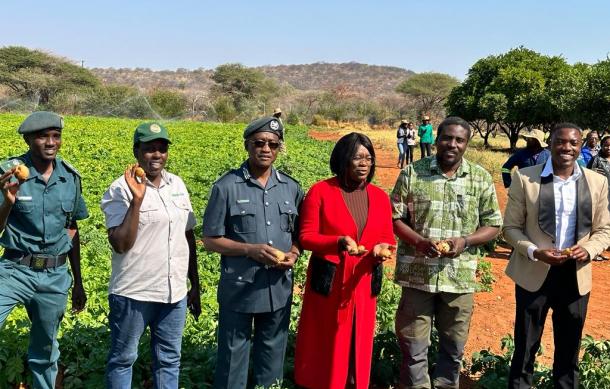
The Namibian Correctional Service (NCS) and the University of Namibia (UNAM) have launched a potato seed multiplication and wheat seed planting programme for sustainable food production at the Evaristus Shikongo Correctional Facility outside Tsumeb.
This follows the signing of an agreement between the two entities.
UNAM, in collaboration with the Namibia Agronomy Board, has embarked on the Seed Research Project with the objective of making the country seed and food secure.
Speaking on behalf of UNAM Chancellor, Vice President Nangolo Mbumba, the Minister in the Presidency, Christine ||Hoebes, said the Seed Research Project comprises two phases.
"Phase one focuses on research by planting various seeds and identifying high-yielding varieties based on the genetics of the seeds. Phase two will focus on seed multiplication in a large-scale area. We expect Namibia to witness milestone improvements in the Namibia Seed Production Industry."
The Namibian Correctional Service provided 0.9 hectares under sprinkler irrigation for potato seed multiplication and 8.5 hectares for the planting of wheat seed under the centre pivot irrigation system.
The NCS will also provide expertise as part of the agreement.
"Both in human and physical resources, including land irrigation and infrastructure, to manage and make sure that the seed multiplication project will reach its ultimate goal of reducing cost, increasing production to contribute to food security, and building a sustainable farming system to build resilience," said NCS Commissioner-General Raphael Hamunyela.
UNAM Vice Chancellor Dr. Kenneth Matengu said the collaboration is the right step towards addressing food security in the country through the use of researchers from the University.
"We have been running this project for the last two to three years, and for your information, the best seed for white maize that is available in the market will give you between 8 and 10 tonnes, sometimes 12 tonnes, per hectare. And our research has proved that we can improve; the best of the cultivators are giving us 18 tonnes per hectare from 12, which is the best at the moment. And on wheat, we have been able to improve from the existing 6 to about 14 tonnes, and so it is the case for potatoes and various others."
The Research Project means to produce new varieties of maize, wheat, potato, mahangu, and sesame, considering Namibia's environmental conditions.





